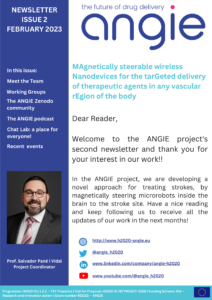All ANGIE news
Learn more about the innovative silicon vascular models developed within the ANGIE project.
The accuracy of these brain 3D models has been recognised in the medical community for their ability to facilitate a realistic and safe environment for doctors treating stroke to hone their skills. Fabian Landers tells us how the new 3D models could lead to earlier and more extensive training.
Dexterous helical magnetic robot for improved endovascular access
Treating vascular diseases in the brain requires access to the affected region inside the body. This is usually accomplished through a minimally invasive technique that involves the use of long, thin devices, such as wires and tubes, that are manually maneuvered by a clinician within the bloodstream. By pushing, pulling, and twisting, these devices are navigated through the tortuous pathways of the blood vessels. The outcome of the procedure heavily relies on the clinician’s skill and the device’s ability to navigate to the affected target region in the bloodstream, which is often inhibited by tortuous blood vessels. Sharp turns require high flexibility, but this flexibility inhibits translation of proximal insertion to distal tip advancement. We present a highly dexterous, magnetically steered continuum robot that overcomes pushability limitations through rotation. A helical protrusion on the device’s surface engages with the vessel wall and translates rotation to forward motion at every point of contact. An articulating magnetic tip allows for active steerability, enabling navigation from the aortic arch to millimeter-sized arteries of the brain. The effectiveness of the magnetic continuum robot has been demonstrated through successful navigation in models of the human vasculature and in blood vessels of a live pig.
Dreyfus R, Boehler Q, Lyttle S, Gruber P, Lussi J, Chautems C, Gervasoni S, Berberat J, Seibold D, Ochsenbein-Kölble N, Reinehr M, Weisskopf M, Remonda L, Nelson BJ. Dexterous helical magnetic robot for improved endovascular access. 2024 Feb ETH Research Collection https://doi.org/10.3929/ethz-b-000659728
Read the full article here: https://zenodo.org/records/10813540
Advancing athletic assessment by integrating conventional methods with cutting-edge biomedical technologies for comprehensive performance, wellness, and longevity insights
In modern athlete assessment, the integration of conventional biochemical and ergophysiologic monitoring with innovative methods like telomere analysis, genotyping/phenotypic profiling, and metabolomics has the potential to offer a comprehensive understanding of athletes’ performance and potential longevity. Telomeres provide insights into cellular functioning, aging, and adaptation and elucidate the effects of training on cellular health. Genotype/phenotype analysis explores genetic variations associated with athletic performance, injury predisposition, and recovery needs, enabling personalization of training plans and interventions. Metabolomics especially focusing on low-molecular weight metabolites, reveal metabolic pathways and responses to exercise. Biochemical tests assess key biomarkers related to energy metabolism, inflammation, and recovery. Essential elements depict the micronutrient status of the individual, which is critical for optimal performance. Echocardiography provides detailed monitoring of cardiac structure and function, while burnout testing evaluates psychological stress, fatigue, and readiness for optimal performance. By integrating this scientific testing battery, a multidimensional understanding of athlete health status can be achieved, leading to personalized interventions in training, nutrition, supplementation, injury prevention, and mental wellness support. This scientifically rigorous approach hereby presented holds significant potential for improving athletic performance and longevity through evidence-based, individualized interventions, contributing to advances in the field of sports performance optimization.
Spanakis Marios, Fragkiadaki Persefoni, Renieri Elisavet, Vakonaki Elena, Fragkiadoulaki Irene, Alegakis Athanasios, Kiriakakis Mixalis, Panagiotou Nikolaos, Ntoumou Eleni, Gratsias Ioannis, Zoubaneas Evangelos, Morozova Galina Dmitrievna, Ovchinnikova Marina Alekseevna, Tsitsimpikou Christina, Tsarouhas Konstantinos, Drakoulis Nikolaos, Skalny Anatoly Viktorovich, Tsatsakis Aristides, Advancing athletic assessment by integrating conventional methods with cutting-edge biomedical technologies for comprehensive performance, wellness, and longevity insights. Frontiers in Sports and Active Living. 2024 Jan;2024
Read the full article here: https://zenodo.org/records/10813025
On-Command Disassembly of Microrobotic Superstructures for Transport and Delivery of Magnetic Micromachines
Magnetic microrobots have been developed for navigating microscale environments by means of remote magnetic fields. However, limited propulsion speeds at small scales remain an issue in the maneuverability of these devices as magnetic force and torque are proportional to their magnetic volume. Here, a microrobotic superstructure is proposed, which, as analogous to a supramolecular system, consists of two or more microrobotic units that are interconnected and organized through a physical (transient) component (a polymeric frame or a thread). The superstructures consist of microfabricated magnetic helical micromachines interlocked by a magnetic gelatin nanocomposite containing iron oxide nanoparticles (IONPs). While the microhelices enable the motion of the superstructure, the IONPs serve as heating transducers for dissolving the gelatin chassis via magnetic hyperthermia. In a practical demonstration, the superstructure’s motion with a gradient magnetic field in a large channel, the disassembly of the superstructure and release of the helical micromachines by a high-frequency alternating magnetic field, and the corkscrew locomotion of the released helices through a small channel via a rotating magnetic field, is showcased. This adaptable microrobotic superstructure reacts to different magnetic inputs, which can be used to perform complex delivery procedures within intricate regions of the human body.
F. C. Landers, V. Gantenbein, L. Hertle, A. Veciana, J. Llacer-Wintle, X.-Z. Chen, H. Ye, C. Franco, J. Puigmartí-Luis, M. Kim, B. J. Nelson, S. Pané, “On-Command Disassembly of Microrobotic Superstructures for Transport and Delivery of Magnetic Micromachines. Adv. Mater. 2023, 2310084. https://doi.org/10.1002/adma.202310084
Read the full article here: https://zenodo.org/records/10549393
ANGIE PhD Award
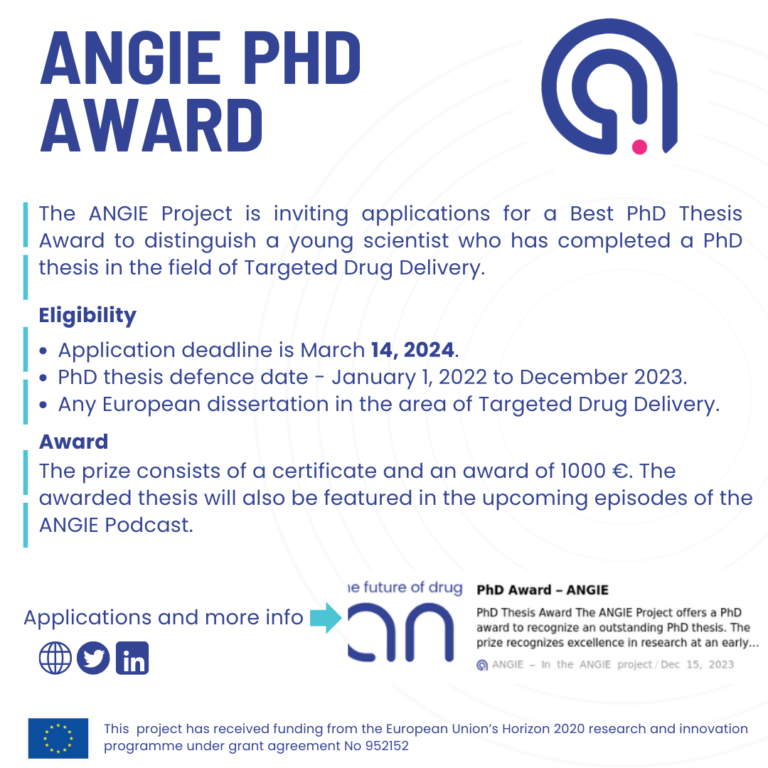
The ANGIE Project is inviting applications for a Best PhD Thesis Award to distinguish a young scientist who has completed a PhD thesis in the field of Targeted Drug Delivery.
Discussion on book chapters of “Emerging Issues on Targeted Drug Delivery in Clinical Environments”
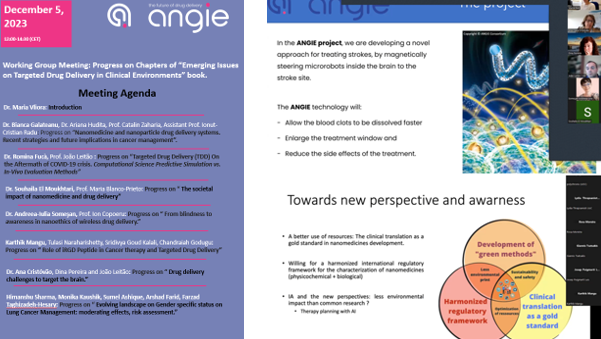
On December 5, 2023, a subsequent meeting was held to review the advancements in the book chapters assigned to various authors. During this session, authoring teams that had completed their work delivered brief presentations to ensure coherence and prevent any overlap between the chapters.
MRS Fall Meeting & Exhibit 2023
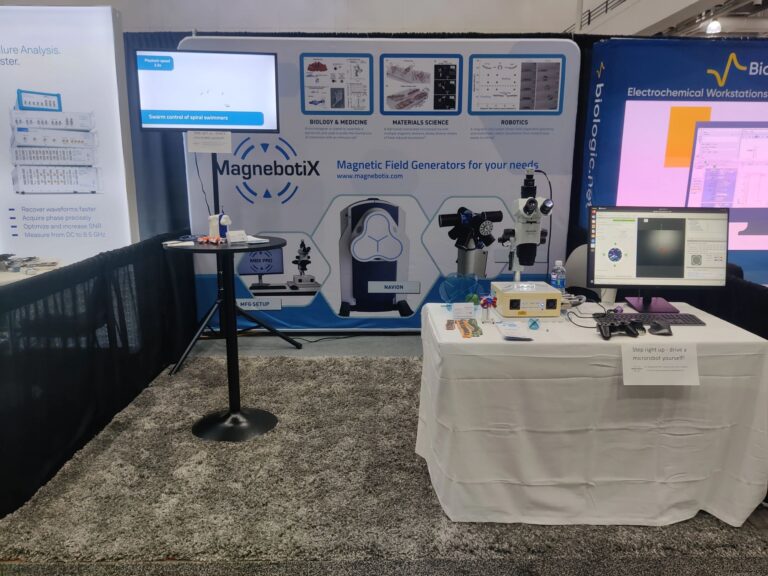
The world’s foremost international scientific gathering for materials research, the MRS Fall Meeting showcases leading interdisciplinary research in both fundamental and applied areas presented by scientists around the world. The meeting incorporates more than 50 technical symposia as well as many “broader impact” sessions that include professional development, government policies and funding opportunities, student activities, award talks and special events. MagnebotiX had the exhibition booth #420 and we were able not only to showcase our work but also facilitated valuable networking opportunities. We connected with like-minded individuals, industry professionals, and potential collaborators, opening doors to exciting possibilities for future endeavours.
Swiss Robotics Day 2023
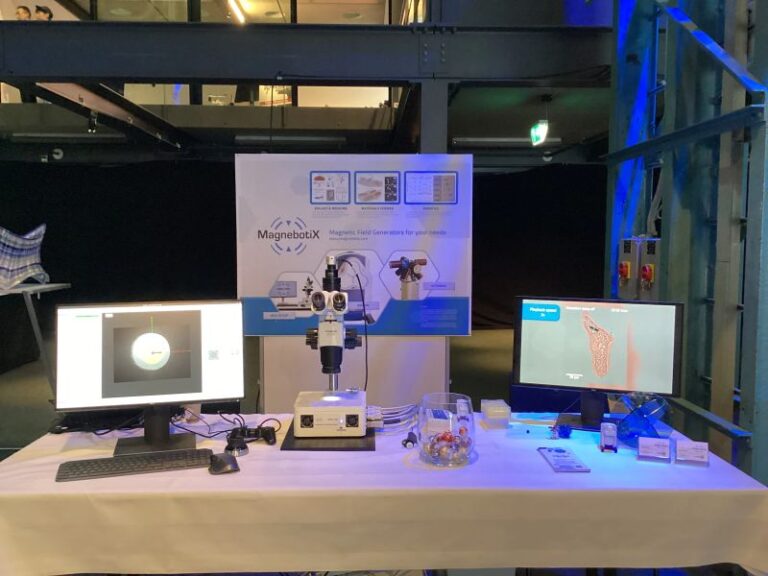
MagnebotiX held a booth at the Swiss Robotics Day on November 3, 2023. This event is Switzerland’s most comprehensive exhibition on robotics for service sectors. It brings together industry, researchers, innovators, investors, engineers and students to exchange and share experiences, new ideas, technologies and together, envision solutions to future needs. More than 900 people participated and more than 70 booths exhibited their newest research and products.
Attendees had the opportunity to dive deep into the details of the ANGIE technology at MagnebotiX’s booth and the feedback we received was overwhelmingly positive!
A novel nutraceutical formulation increases telomere length and activates telomerase activity in middle‑aged rats
Telomeres are major contributors to cell fate and aging through their involvement in cell cycle arrest and senescence. The accelerated attrition of telomeres is associated with aging-related diseases, and agents able to maintain telomere length (TL) through telomerase activation may serve as potential treatment strategies. The aim of the present study was to assess the potency of a novel telomerase activator on TL and telomerase activity in vivo. The administration of a nutraceutical formulation containing Centella asiatica extract, vitamin C, zinc and vitamin D3 in 18-month-old rats for a period of 3 months reduced the telomere shortening rate at the lower supplement dose and increased mean the TL at the higher dose, compared to pre-treatment levels. TL was determined using the Q-FISH method in peripheral blood mononuclear cells collected from the tail vein of the rats and cultured with RPMI-1640 medium. In both cases, TLs were significantly longer compared to the untreated controls (P≤0.001). In addition, telomerase activity was increased in the peripheral blood mononuclear cells of both treatment groups. On the whole, the present study demonstrates that the nutraceutical formulation can maintain or even increase TL and telomerase activity in middle-aged rats, indicating a potential role of this formula in the prevention and treatment of aging-related diseases.
Tsatsakis A, Renieri E, Tsoukalas D, Buga AM, Sarandi E, Vakonaki E, Fragkiadaki P, Alegakis A, Nikitovic D, Calina D, Spandidos DA, Docea AO. A novel nutraceutical formulation increases telomere length and activates telomerase activity in middle‑aged rats. Mol Med Rep. 2023 Dec;28(6):232. doi: 10.3892/mmr.2023.13119.
Read the full article here: https://zenodo.org/records/10776679
Simultaneous Localization and Actuation Using Electromagnetic Navigation Systems
Remote magnetic navigation provides a promising approach for improving the maneuverability and safety of surgical tools, such as catheters and endoscopes, in complex anatomies. The lack of existing localization systems compatible with this modality, beyond fluoroscopy and its harmful ionizing radiation, impedes its translation to clinical practice. To address this challenge, we propose a localization method that achieves full pose estimation by superimposing oscillating magnetic fields for localization onto actuation fields generated by an electromagnetic navigation system. The resulting magnetic field is measured using a three-axis magnetic field sensor embedded in the magnetic device to be localized. The method is evaluated on a three-coil system, and simultaneous actuation and localization is demonstrated with a magnetic catheter prototype with a Hall-effect sensor embedded at its tip. We demonstrate position estimation with mean accuracy and precision below 1 mm, and orientation estimation with mean errors below 2 deg at 10 Hz in a workspace of 80 x 80 x 60 mm. This contribution aims to advance the clinical adoption of remote magnetic navigation in minimally invasive surgery.
D. v. Arx, C. Fischer, H. Torlakcik, S. Pané, B. J. Nelson and Q. Boehler
Read the full article here: https://zenodo.org/records/10651114
International Conference on Manipulation, Automation, and Robotics at Small Scales (MARSS) 2023

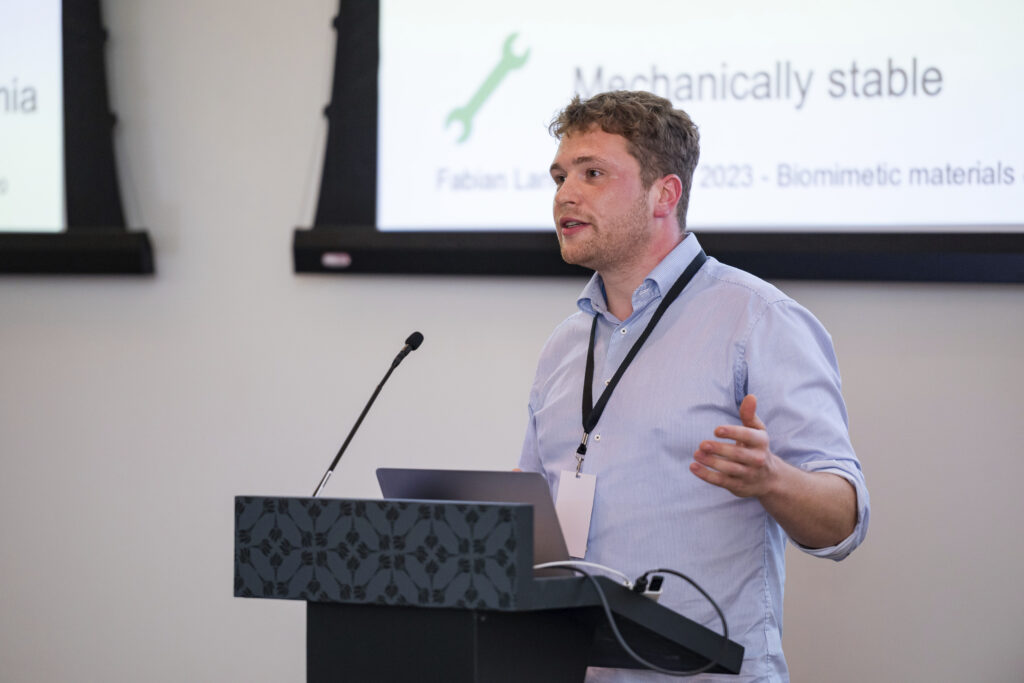
MARSS, the annual International Conference on Manipulation, Automation and Robotics at Small Scales, was held Oct. 09-13, 2023 in Abu Dhabi, UAE. The conference is the flagship forum for cross-disciplinary R&D communities to discuss current activities on manipulation & automation (incl. measurement and characterization) at micro/nano scales, and to all kinds of small-scale robots and their applications.
Prof. Salvador Pané gave a plenary talk entitled “Materials for small-scale robots”. His talk explored various material-based concepts and innovative fabrication techniques to address translational challenges and further enhance the field of small-scale robotics. In the special technical session “Biomimetic materials & advanced controlled systems in Small Robotics” Fabian Landers gave a presentation entitled “Multi-functional interlocked microrobotic superstructures”.
3D Motion Manipulation for Micro- and Nanomachines: Progress and Future Directions
In the past decade, micro- and nanomachines (MNMs) have made outstanding achievements in the fields of targeted drug delivery, tumor therapy, microsurgery, biological detection, and environmental monitoring and remediation. Researchers have made significant efforts to accelerate the rapid development of MNMs capable of moving through fluids by means of different energy sources (chemical reactions, ultrasound, light, electricity, magnetism, heat, or their combinations). However, the motion of MNMs is primarily investigated in confined two-dimensional (2D) horizontal setups. Furthermore, three-dimensional (3D) motion control remains challenging, especially for vertical movement and control, significantly limiting its potential applications in cargo transportation, environmental remediation, and biotherapy. Hence, an urgent need is to develop MNMs that can overcome self-gravity and controllably move in 3D spaces. This review delves into the latest progress made in MNMs with 3D motion capabilities under different manipulation approaches, discusses the underlying motion mechanisms, explores potential design concepts inspired by nature for controllable 3D motion in MNMs, and presents the available 3D observation and tracking systems..
H. Huang, S. Yang, Y. Ying, X. Chen, J. Puigmartí-Luis, L. Zhang, S. Pané, 3D Motion Manipulation for Micro- and Nanomachines: Progress and Future Directions. Adv. Mater. 2024, 36, 2305925. https://doi.org/10.1002/adma.202305925
Read the full article here: https://zenodo.org/records/10651024
Site-specific PEGylation of recombinant tissue-type plasminogen activator
Τissue-type plasminogen activator (tPA) is the gold standard for emergency treatment of ischemic stroke, which is the third leading cause of death worldwide. Major challenges of tPA therapy are its rapid elimination by plasminogen activator inhibitor-1 (PAI-1) and hepatic clearance, leading to the use of high doses and consequent serious side effects, including internal bleeding, swelling and low blood pressure. In this regard, we developed three polyethylene glycol (PEG)ylated tPA bioconjugates based on the recombinant human tPA drug Alteplase using site-specific conjugation strategies. The first bioconjugate with PEGylation at the N-terminus of tPA performed by reductive alkylation showed a reduced proteolytic activity of 68 % compared to wild type tPA. PEGylation at the single-free cysteine of tPA with linear and branched PEG revealed similar proteolytic activities as the wild-type protein. Moreover, both bioconjugates with PEG-cysteine-modification showed 2-fold slower inhibition kinetics by PAI-1. All bioconjugates increased in hydrodynamic size as a critical requirement for half-life extension.
Kirstin Meiners, Prisca Hamm, Marcus Gutmann, Jan Niedens, Agnieszka Nowak-Król, Salvador Pané, Tessa Lühmann, Site-specific PEGylation of recombinant tissue-type plasminogen activator, European Journal of Pharmaceutics and Biopharmaceutics, https://doi.org/10.1016/j.ejpb.2023.09.017.
Read the full article here: https://zenodo.org/records/10550854
Fall Meeting of the European Materials Research Society 2023
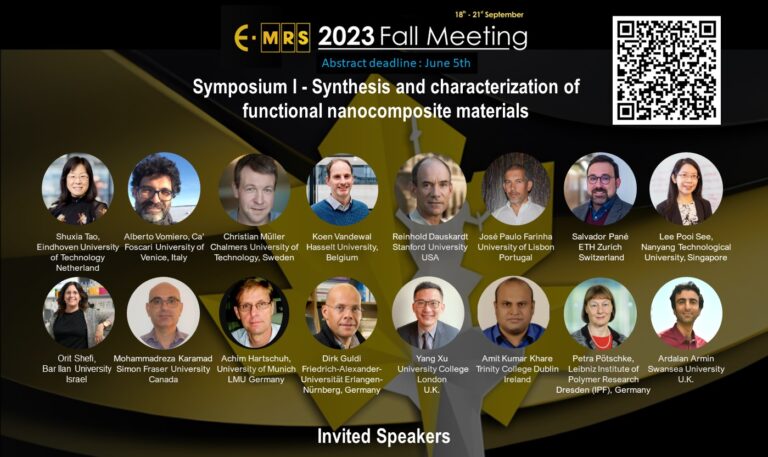
The 2023 Fall Meeting of the European Materials Research Society (E-MRS) took place from September 18 to 21, 2023 at the main campus of the University of Technology in Warsaw and was consisted of parallel symposia with invited speakers, oral and poster presentations assorted by one plenary session to provide an international forum for discussing recent advances in the field of materials science. The focus of the scientific program was on fundamental investigations and technological applications, providing an international forum for discussing recent advances related to the different aspects to be considered to promote innovation. At Symposium I entitled “Synthesis and Characterization of Functional Nanocomposite Materials, Professor Salvador Pane gave a talk on “Materials for Biomedical Microrobots”.
ANGIE Kick-start Final Bootcamp
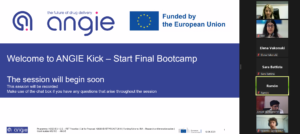
In the final bootcamp of the ANGIE Kick-start Programme, all participants were able to present their idea for a new targeted drug delivery therapy to the other participants, the consortium partners and selected invitees. ANGIE kick-start teams received individual feedback and tailored advice to define the technical and clinical feasibility of their projects. MICROTAP & LRB bot projects will be invited to participate in the ANGIE Acceleration Programme that runs in 2023-2024 and will provide further support.
Working Group Meeting: Discussion on Chapters of “Emerging Issues on Targeted Drug Delivery in Clinical Enviroments” book
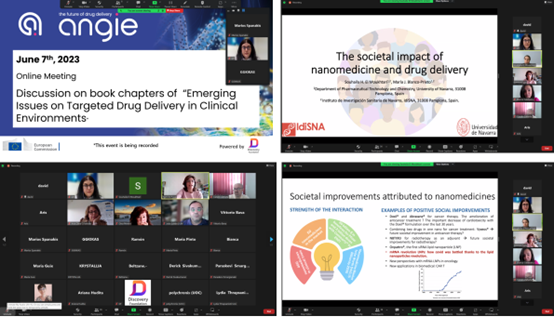
On June 7, 2023, the initial gathering pertaining to the book occurred, involving participants from both the working groups and the consortium. The purpose of this meeting was to deliberate on the frameworks of assigned chapters and ensure a consistent writing style across all authoring teams..
Ansan City meeting
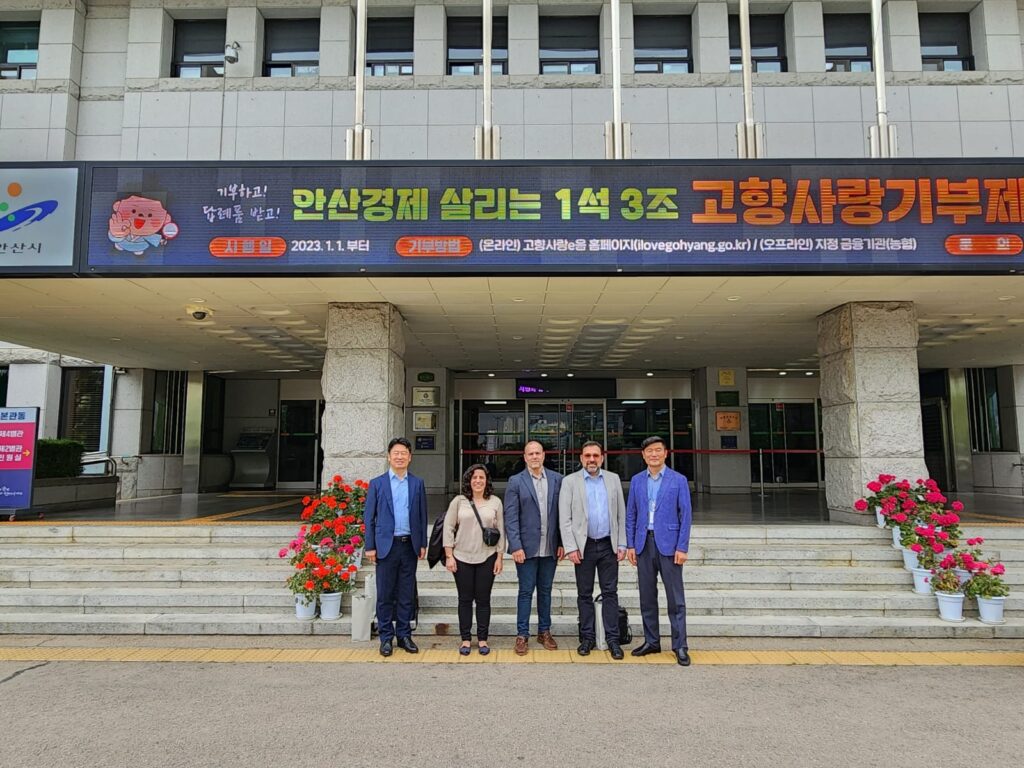
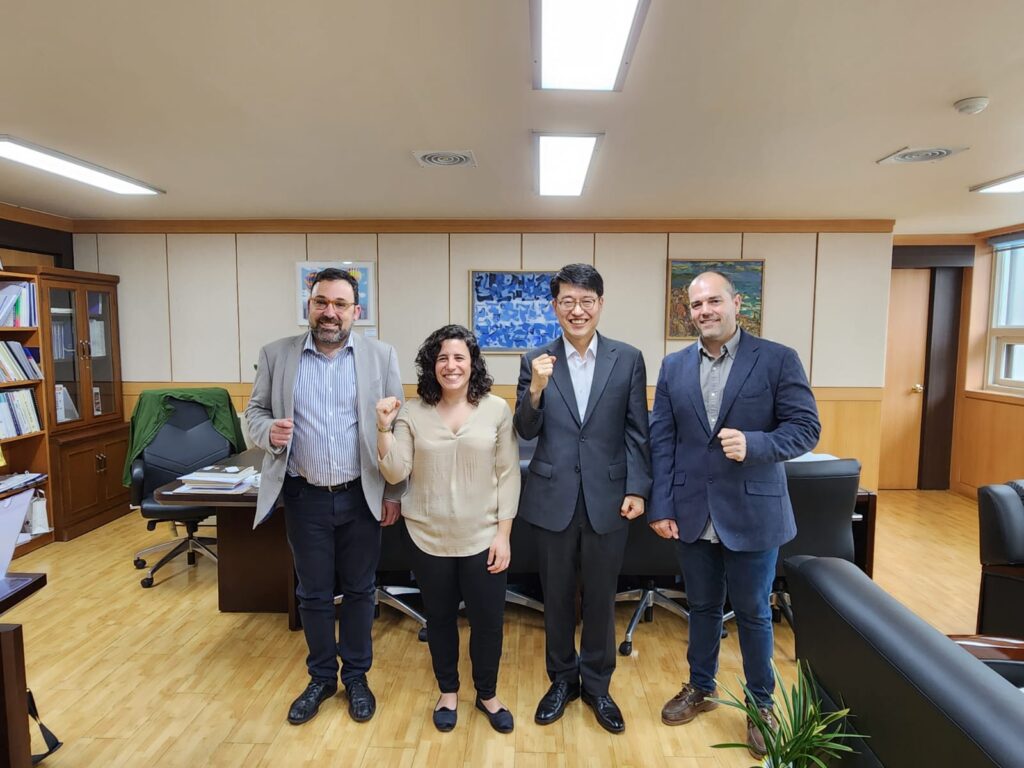
The ANGIE’s consortium visited South Korea and held a meeting with David Kim, the vice-mayor of Ansan city. Professor Salvador Pané (ETHZ), Professor Josep Puigmartí-Luis (UB) and Dr. Maria Guix (UB) presented the ANGIE project and our innovative initiatives, showcasing the positive impact of our technology. In addition, we discussed future collaborations in pilot studies and opening branches of robotic startups in Ansan city.
The ANGIE podcast ft Prof Maria Blanco-Prieto Episode 2
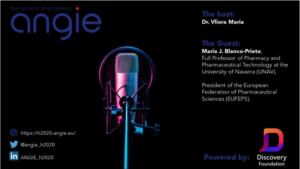
The 2nd episode of The ANGIE Podcast is out!!! Tune in to listen a fascinating conversation between Dr Maria Vliora and our guest expert Prof Maria Blanco-Prieto on how nanomedicine can change medical treatment.
New nanotechnology for therapeutic purposes: ANGIE
ANGIE will create an innovation eco-system around a radically new technology for localized targeted drug delivery in clinical environments based on magnetically steerable wireless nanodevices.
This article was published by www.europeandissemination.eu
3D Printed Template-Assisted Casting of Biocompatible Polyvinyl Alcohol-Based Soft Microswimmers with Tunable Stability
The past decade has seen an upsurge in the development of small-scale magnetic robots for various biomedical applications. However, many of the reported designs comprise components with biocompatibility concerns. Strategies for fabricating biocompatible and degradable microrobots are required. In this study, polyvinyl alcohol (PVA)-based magnetic hydrogel microrobots with different morphologies and tunable stability are developed by combining a 3D printed template-assisted casting with a salting-out process. 3D sacrificial micromolds are prepared via direct laser writing to shape PVA-magnetic nanoparticle composite hydrogel microrobots with high architectural complexity. By adjusting the PVA composition and salting-out parameters, the hydrogel dissolubility can be customized. Due to their high mobility, tunable stability, and high biocompatibility, these PVA-based magnetic microrobots are suitable platforms for targeted drug and cell delivery.
Sanchis-Gual, H. Ye, T. Ueno, F. C. Landers, L. Hertle, S. Deng, A. Veciana, Y. Xia, C. Franco, H. Choi, J. Puigmartí-Luis, B. J. Nelson, X.-Z. Chen, S. Pané, 3D Printed Template-Assisted Casting of Biocompatible Polyvinyl Alcohol-Based Soft Microswimmers with Tunable Stability. Adv. Funct. Mater. 2023, 33, 2212952. https://doi.org/10.1002/adfm.202212952
Read the full article here: https://zenodo.org/records/10550966
ANGIE Working Groups
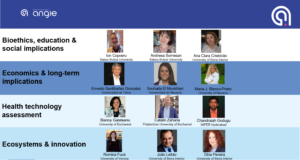
The ANGIE Working Groups have meetings throughout the year where the members explore different issues around targeted drug delivery, exchange ideas, experiences and research results to increase the public understanding of our new technology via an interpretive social science and humanities perspective, which enables to highlight issues of justice, gender, power, and identity. Groups membership will be open during the project’s lifecycle! If you wish to join us, please contact: mvliora@discoveryfoundation.eu
The hospital of the future – advances in healthcare robotics
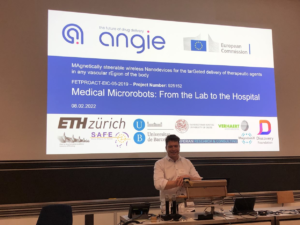
Synergies among projects can lead to a wide range of opportunities for municipalities and to innovative solutions. When diverse perspectives and expertise are brought together, new opportunities and approaches may be identified. In this scope, in February 2023 we participated to “The hospital of the future – advances in healthcare robotics” event. The participants had the chance to get insights from the several projects and companies about future technologies and the possible outcome of these developments. The event was open for experts from hospitals, the healthcare sector, industry and academia as well as other interested parties. We are grateful for the opportunity and looking forward to further collaboration.
Hospital Clinic de Barcelona In-House Seminar
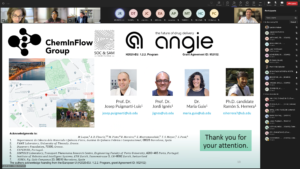
The ANGIE project was presented at the Hospital Clínic de Barcelona in -House Seminar. The seminar was hosted by Dr. Mertixell Nomdedeu.
The ANGIE podcast ft Fabian Landers Episode 1
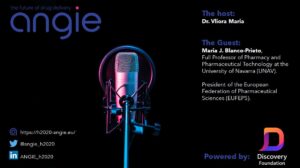
The first episode of the ANGIE project is now live! Tune in on our YouTube channel where, along with Fabian Landers, we introduce our project and have a very interesting conversation on Targeted Drug Delivery and how it is approached within our project.
